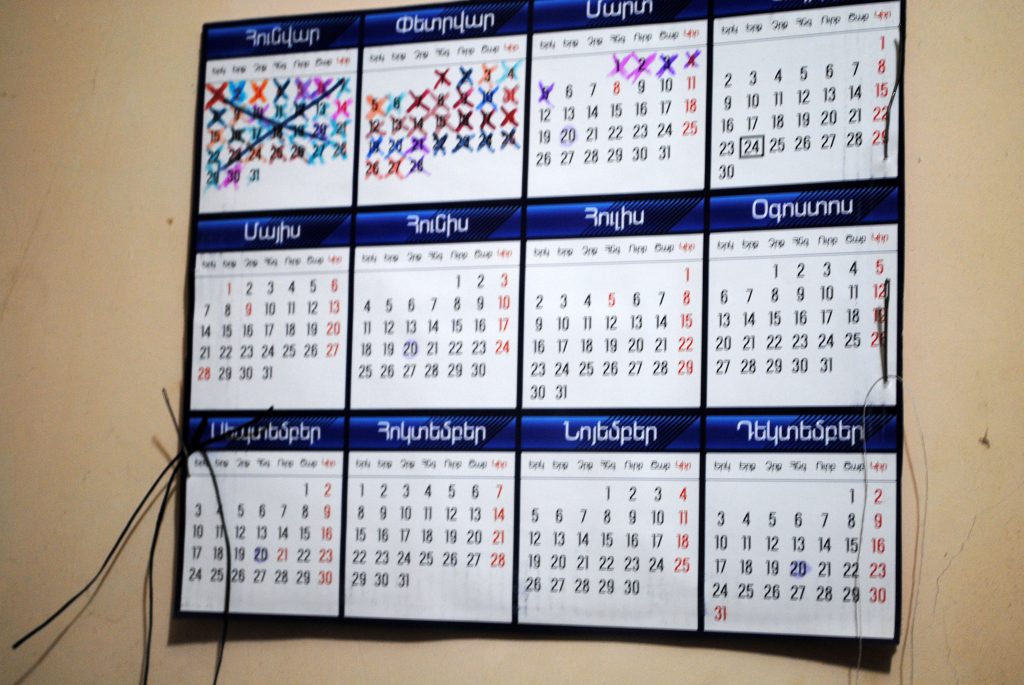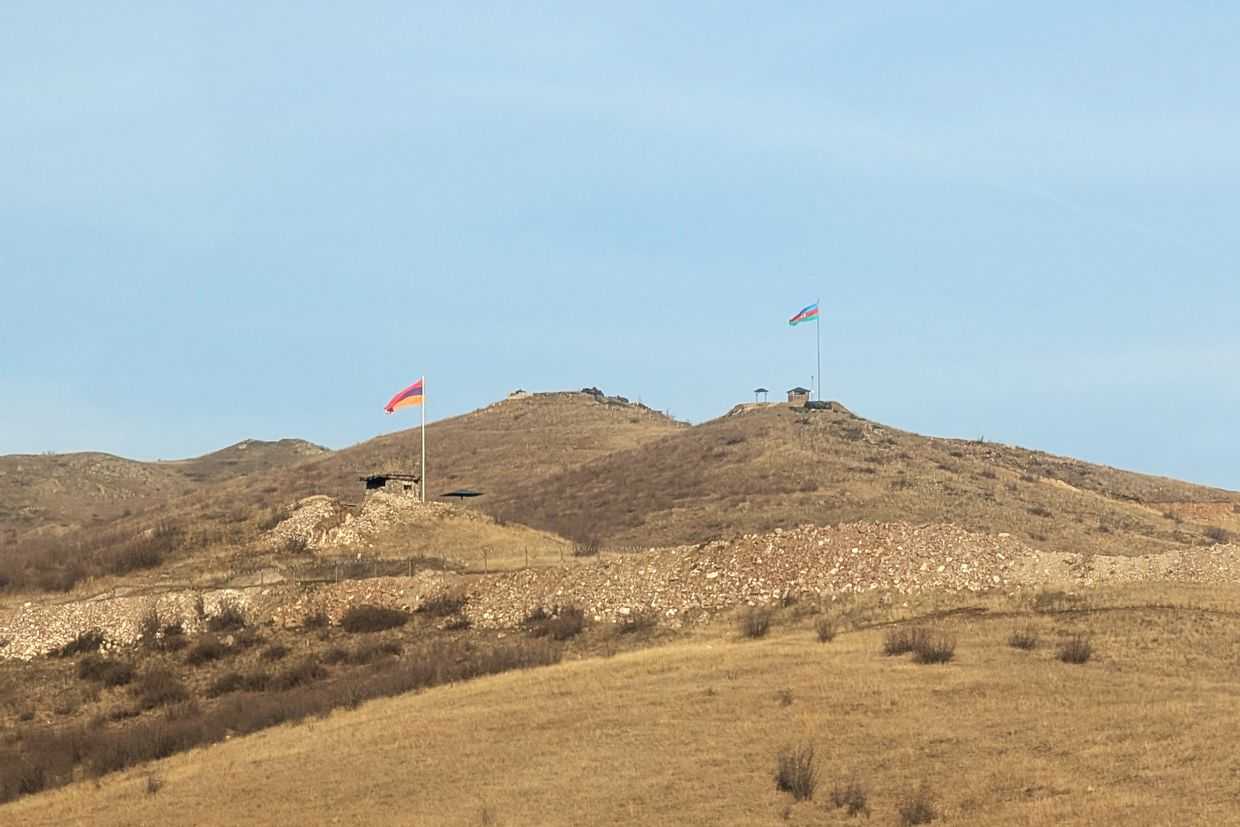‘Happy is he who is happy at home’ — a Syrian shoemaker in Nagorno-Karabakh


 Stories written about Armenians from the diaspora who moved to Nagorno-Karabakh are, as a rule, positive: about successful businesses or achievements in agriculture. But among those who moved to Nagorno-Karabakh there are many who struggle to make ends meet; the Demirchyans, are such a family. They decided not to run away from problems, but to stay in Nagorno-Karabakh.
Stories written about Armenians from the diaspora who moved to Nagorno-Karabakh are, as a rule, positive: about successful businesses or achievements in agriculture. But among those who moved to Nagorno-Karabakh there are many who struggle to make ends meet; the Demirchyans, are such a family. They decided not to run away from problems, but to stay in Nagorno-Karabakh.
Sixty-seven-year old Nerses Demirchyan moved to Nagorno-Karabakh from Syria in 2001 with his wife Anzhela and his mother. He and two friends decided they wanted to settle here and stay.
Many Armenians from the diaspora consider Nagorno-Karabakh their homeland, and during the Karabakh war, some Armenians from the diaspora also fought here.
‘We three friends came here. Since we were not able to take part in the Karabakh war, we decided to come and just live here, thereby contributing to the prosperity of our homeland’, Nerses tells OC Media.
Moving to Nagorno-Karabakh



According to official data, 26 of the 40 families who moved from Syria to Nagorno-Karabakh live in Kashatagh (previously Lachin) District. Most of them came after the outbreak of the Syrian civil war. Such families were provided with housing by the government.
A number of government programmes and charitable organisations have provided them with food, household appliances, household goods, money, and other help. Those working in agriculture were given loans of up to ֏200 million ($400,000).
Nerses and his two friends took 100 hectares of land. ‘We decided to start farming, but the hail destroyed the whole harvest’, Nerses said.
His friends left, but Nerses stayed — along with his wife and 100-year-old mother. At first, they lived in a house provided by the government in the village of Vazgenashen (formerly Abdalgulabli) in the Martuni District. Their remaining savings were used to sustain themselves.
However, it became clear that Nerses could no longer work on the land by himself. So the Demirchyans moved to Stepanakert, where they opened a shoemaking workshop.
‘Soon, once I realised I could not afford an apartment, we had to move to Shushi — it’s cheaper to rent there’, he says
In the workshop


Every morning, Nerses travels 11 kilometres from Shushi to Stepanakert, returning in the evening. Nerses, a shoemaker by profession, says he did not think that one day he would not be modelling his own shoes, but simply repairing old ones.
‘In Syria, in the Arab world in general, the shoe business is a profitable trade. Here, on the contrary, we barely make ends meet’, he says.
And so he lives in his own world — in the workshop — where he keeps coloured pencils and markers alongside his shoemaking tools, for drawing and recording his thoughts.
The pictures, hanging on the walls of the workshop are dominated by reds and greens. ‘Two extremes, well, I am an Armenian […] there is no middle-ground. When I am peaceful, I paint in green, when restless — in red. I work more with red: there is too much that excites the soul. There is enough reason for worry until death’, Nerses says.
He then point to an inscription: ‘Happy is he who is happy at home’.
‘I’m already tired of moving, and where would I go, where is it best for a person of my age?’ Nerses asks.
Surviving as best they can


Nerses suffers from heart problems, but he says he doesn’t think about them, worrying instead about his sick wife and mother. ‘You can live on ֏150,000 ($320) [per month], but when someone is sick at home, you need at least ֏350,000 ($730) to cope’.
The family’s stable, regular income is no more than ֏60,000 drams ($125) per month — mostly from pensions and benefits. The rest comes from whatever Nerses manages to earn.
In addition to shoes, he also makes leather accessories with Armenian patterns — hoping to sell them with his wife’s needlework.
‘We are thinking of selling our goods in a souvenir shops near the [We Are Our Mountains] monument’, Nerses says.
He says that to start a small shop, he will need around ֏200,000 ($415), which he does not have.
‘What happens to all — happens to us’
Despite the problems, the Demirchyans continue living in Nagorno-Karabakh. Returning to Syria is impossible due to the ongoing conflict there. Although the situation in Nagorno-Karabakh is not much better — the danger of renewed hostilities still remains.
‘We will live like everyone else, why are we better that the local population? So what if the war might resume? We are at home. What happens to us all — happens to us’, he says.
The family say they hope it will be possible to sell their land in Syria, which Nerses’ wife Anzhela inherited from her parents.
‘We really hope that with this money we could buy an apartment here and open a small workshop. Then we won’t have to pay rent, and there will be less to worry about’, Nerses concludes.
 This article is published as part of International Alert’s work on the Nagorno-Karabakh conflict, which is part of the European Partnership for the Peaceful Settlement of the Conflict over Nagorno-Karabakh (EPNK), a European Union Initiative. All opinions expressed are the author’s alone, and may not necessarily reflect the views of OC Media, International Alert or its donors.
This article is published as part of International Alert’s work on the Nagorno-Karabakh conflict, which is part of the European Partnership for the Peaceful Settlement of the Conflict over Nagorno-Karabakh (EPNK), a European Union Initiative. All opinions expressed are the author’s alone, and may not necessarily reflect the views of OC Media, International Alert or its donors.













